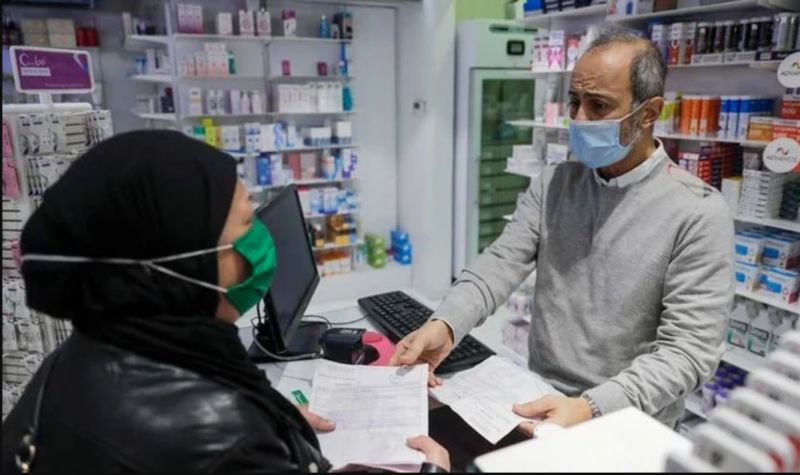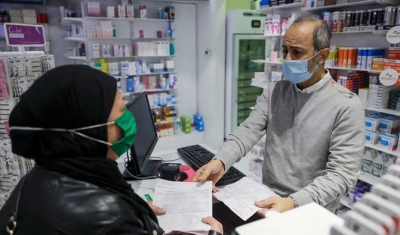
A woman buying medicine in a pharmacy in Beirut. (Credit: AFP)
In a Feb. 9 report, Amnesty International denounced widespread medication shortages in Lebanon, especially for those used in treating illnesses like cancer.
The report also criticized the unaffordable prices of non-subsidized medications and stressed the “unimaginable levels of suffering” incurred by the situation.
Amnesty called on authorities to ensure “availability, accessibility and affordability of medication — even in the face of financial challenges,” and suggested increasing the budget of primary health care centers.
Lebanon has been suffering from severe shortages of pharmaceutical products since the onset of the major economic crisis in 2019. Many people are forced to purchase their own medications from abroad and pay in dollars.
Since November 2021, when subsidies were lifted off most medications, many medications have become prohibitively priced to most people.
“People in Lebanon are facing unimaginable levels of suffering while trying to get their hands on life-saving medication,” said Aya Majzoub, Amnesty International’s deputy director for the Middle East and North Africa. “The Lebanese authorities, meanwhile, continue to shirk their responsibility to safeguard the right to health.”
Cancer medications
Amnesty pointed to “severe shortages” of medications used by cancer patients, even though “they are one of the few categories of medicine that remain subsidized by the government.”
Since 2019, the Ministry of Public Health has partially blamed the shortages on traders and smugglers who purchase the medicine at low, subsidized rates and hoard them before selling them at inflated prices.
“The government’s attempts to combat this issue and hold those responsible to account are inadequate,” the Amnesty report added.
“Cancer patients are also importing” their own chemotherapy drugs “so they can continue treatment in hospitals …Other patients are rationing or substituting medicine to save money, with serious adverse health impacts,” the report said.
“There are also acute shortages of unsubsidized medication as importers are unable to bring in the necessary quantities of medicine due to the country’s ongoing financial crisis,” the report continued.
According to Amnesty, one reason behind these shortages is the large debt importers owe to pharmaceutical companies abroad. This debt drives importers to refuse to send medications to Lebanon until the owed amounts are at least partially settled.
When non-subsidized medications are available to people, their new prices “are out of most people’s reach. Sometimes prices [are] double the minimum wage,” added Amnesty.
Primary health centers run by the Health Ministry, where these medications are available at a low price, “have become one of the few options available for patients seeking free or low-cost medication.”
According to a Health Ministry official contacted by Amnesty International, the number of people that sought their medications from these centers increased by 62 percent since 2020. In the same time frame, the authorities did not increase their budget for these centers.
Call for the international community
“The Lebanese authorities must prioritize the availability, accessibility and affordability of medication — even in the face of financial challenges. The right to health cannot and should not be sacrificed,” said Amnesty.
In order to remedy this dire state of affairs, the organization called on authorities to "increase the budget for primary health care centers, address shortages in subsidized and unsubsidized medications, strengthen social assistance programs and implement long overdue economic and financial reforms necessary to safeguard human rights.”
“The international community should increase funding to organizations providing affordable and accessible health services,” Amnesty added.
This article was originally published in French in L’Orient Le-Jour. Translation by Joelle El Khoury.
